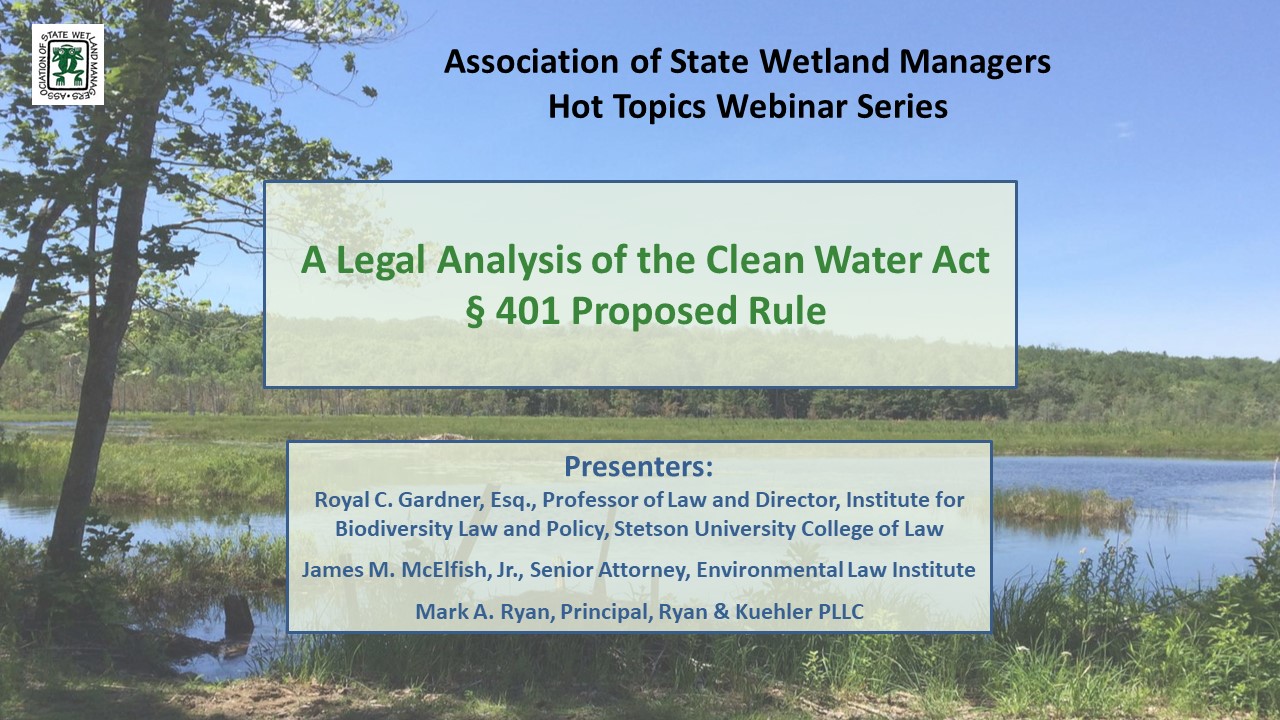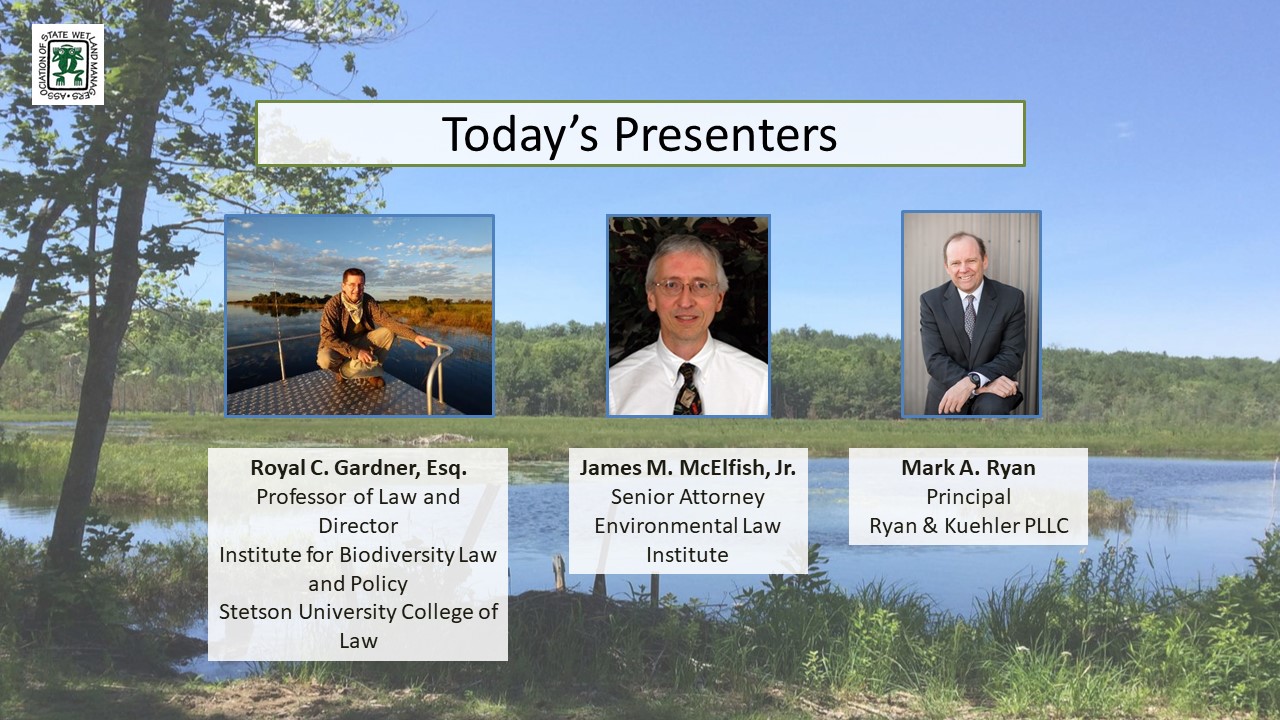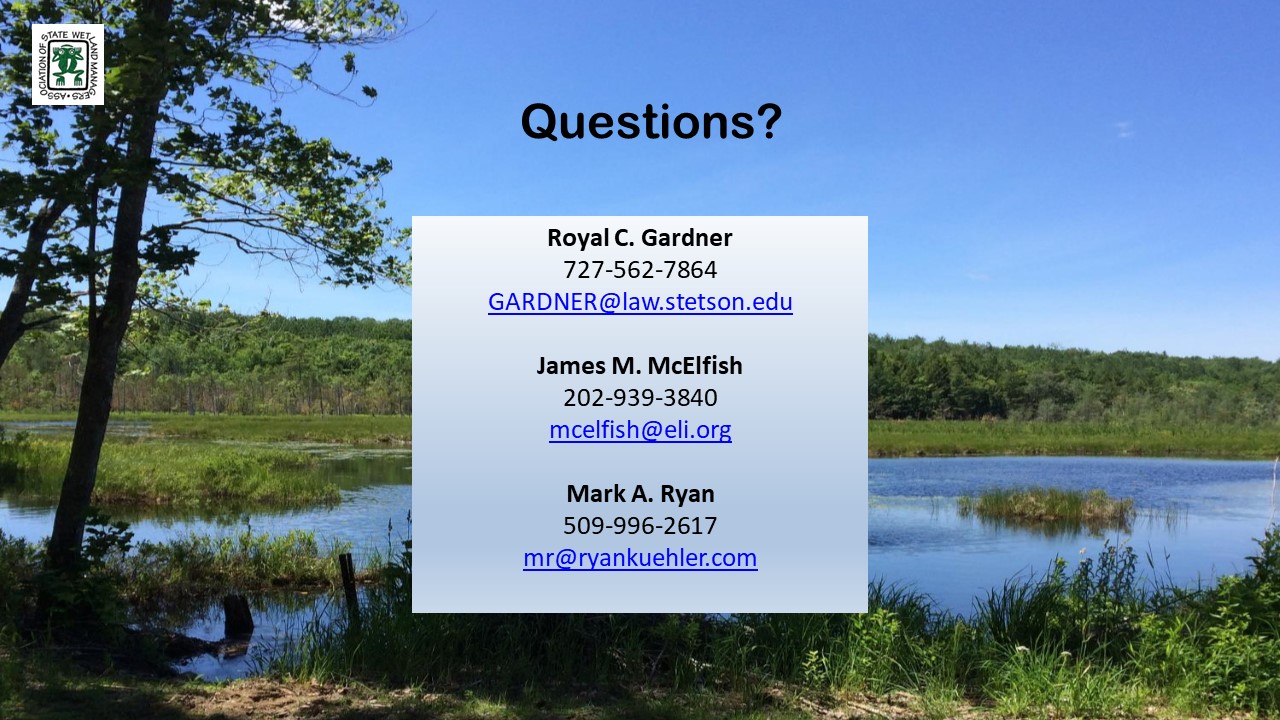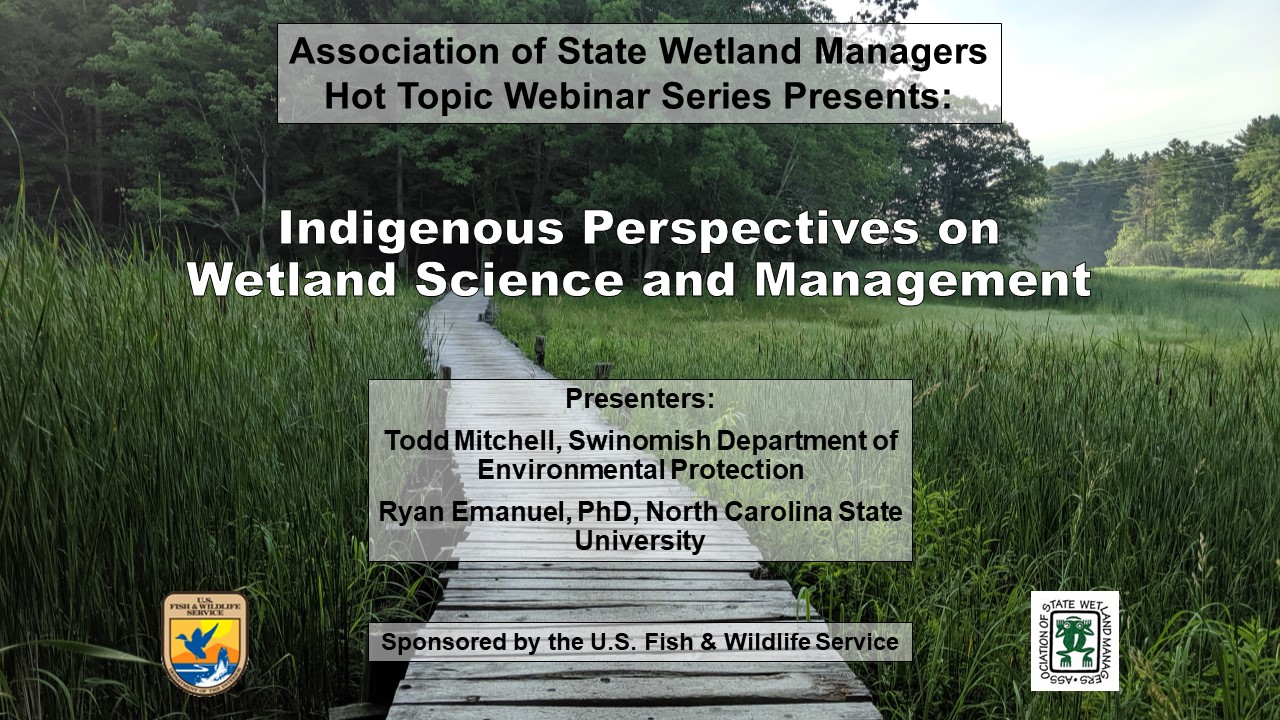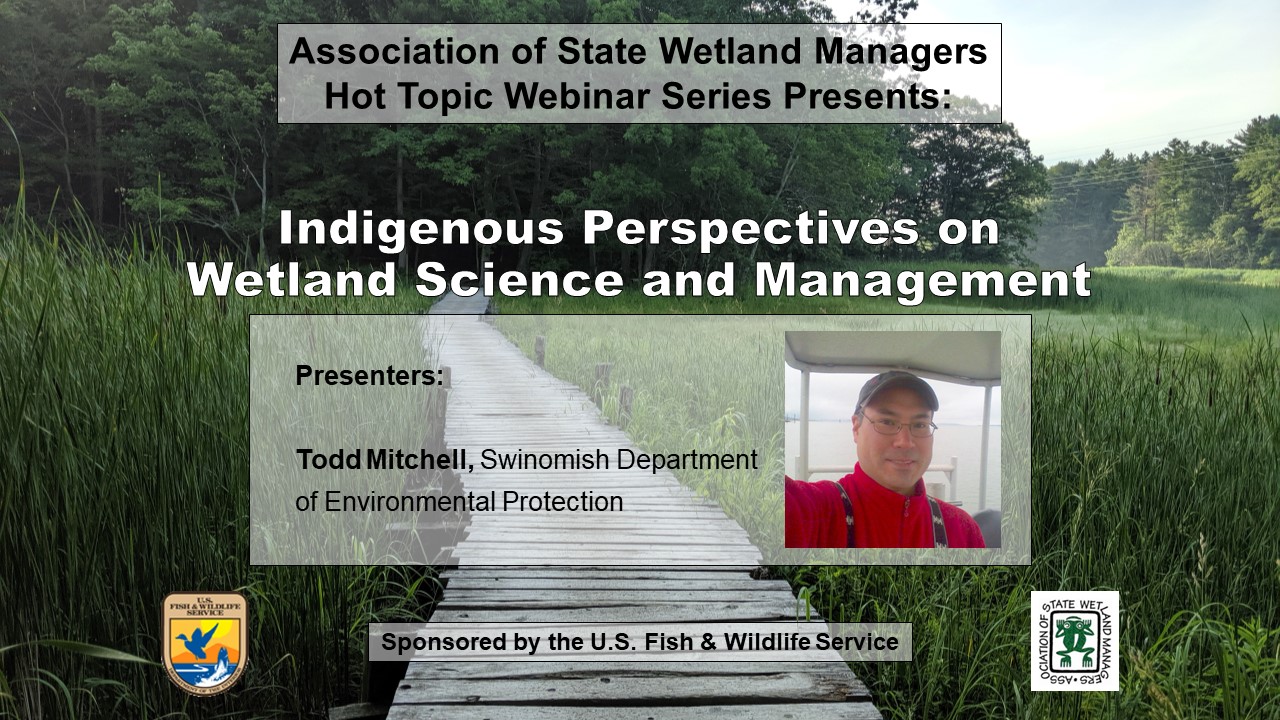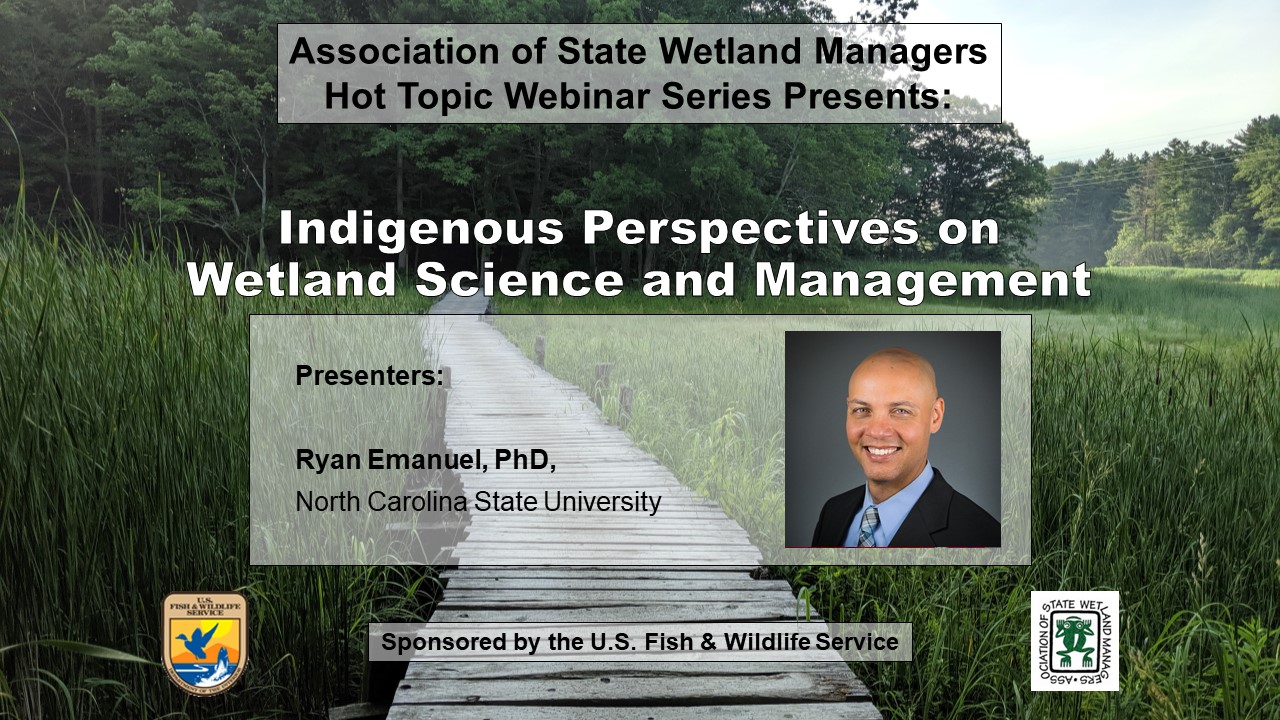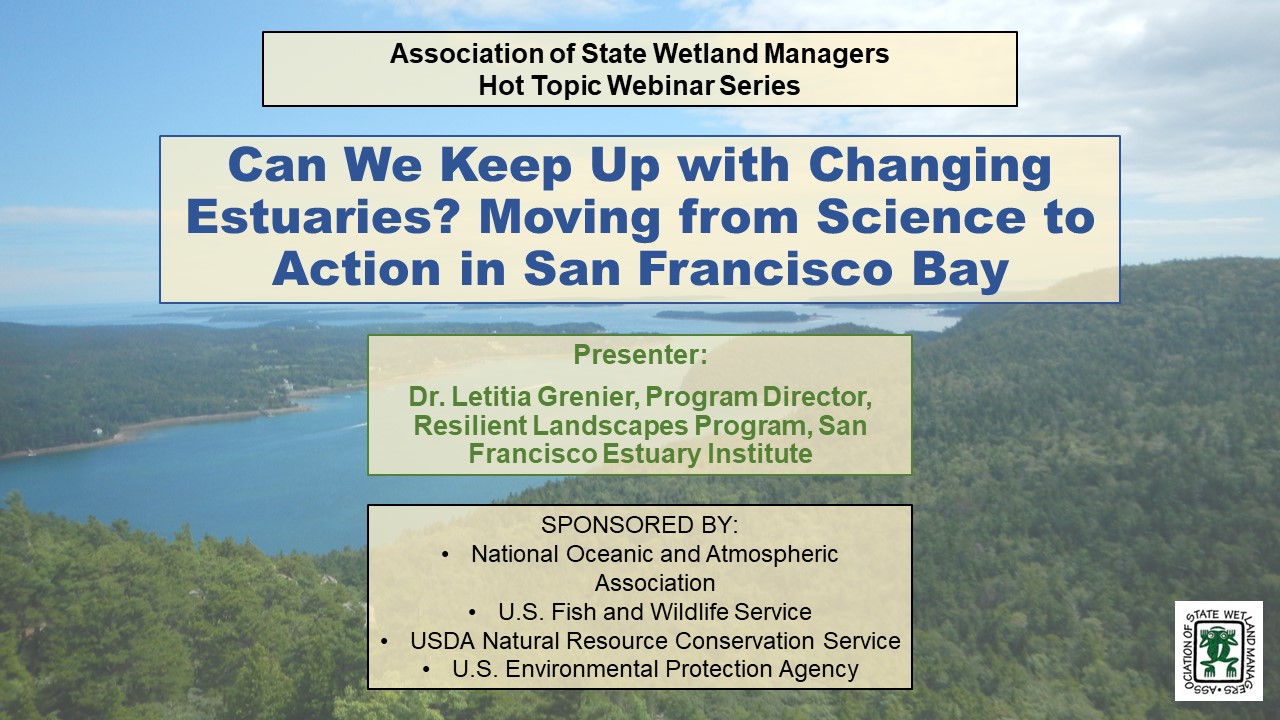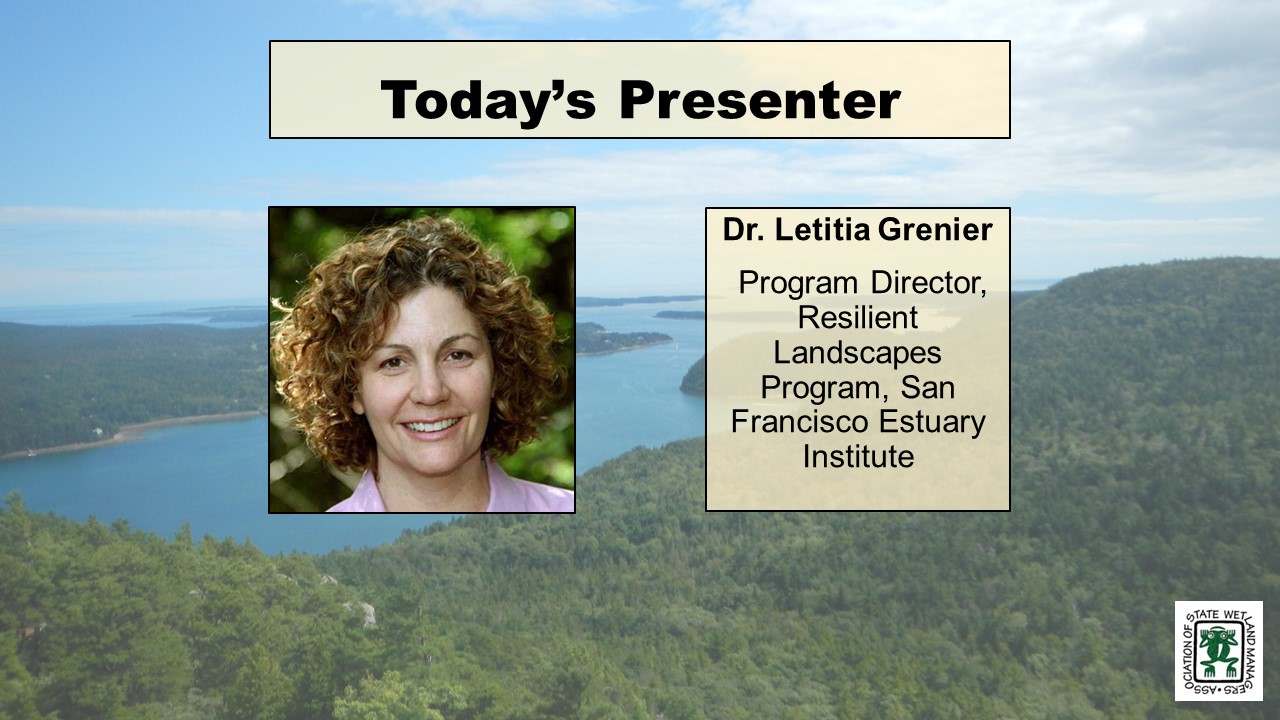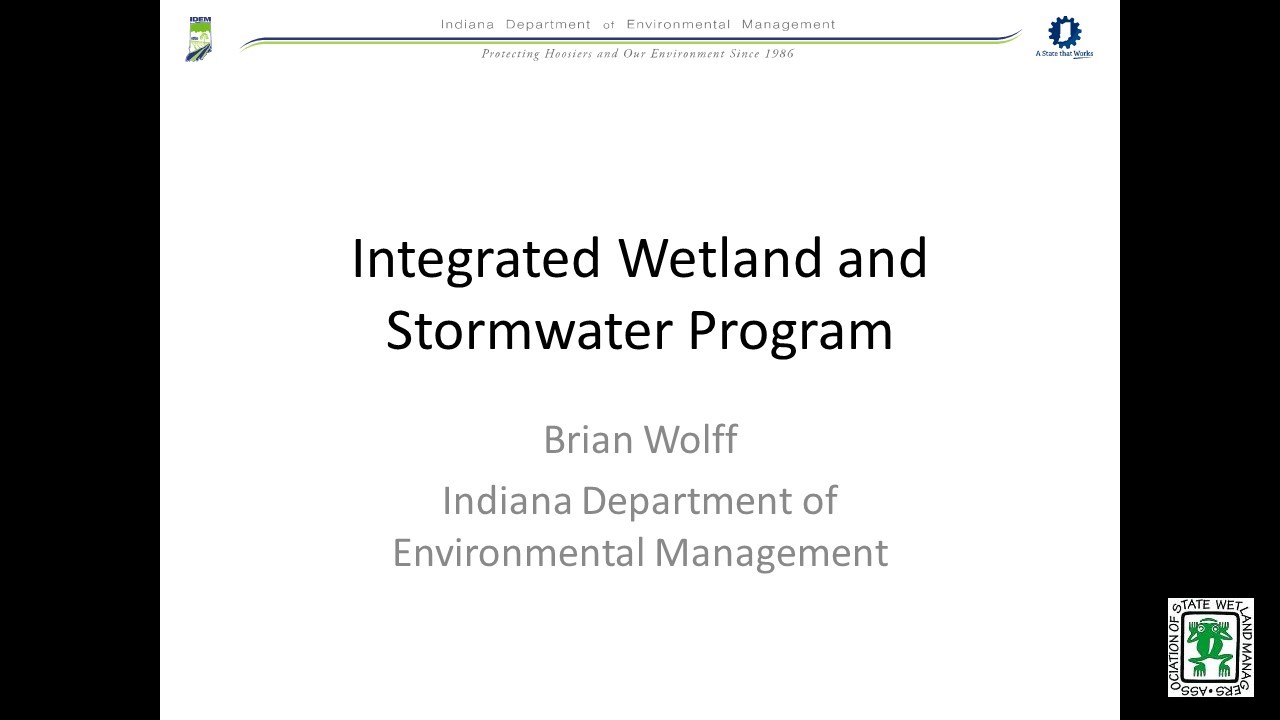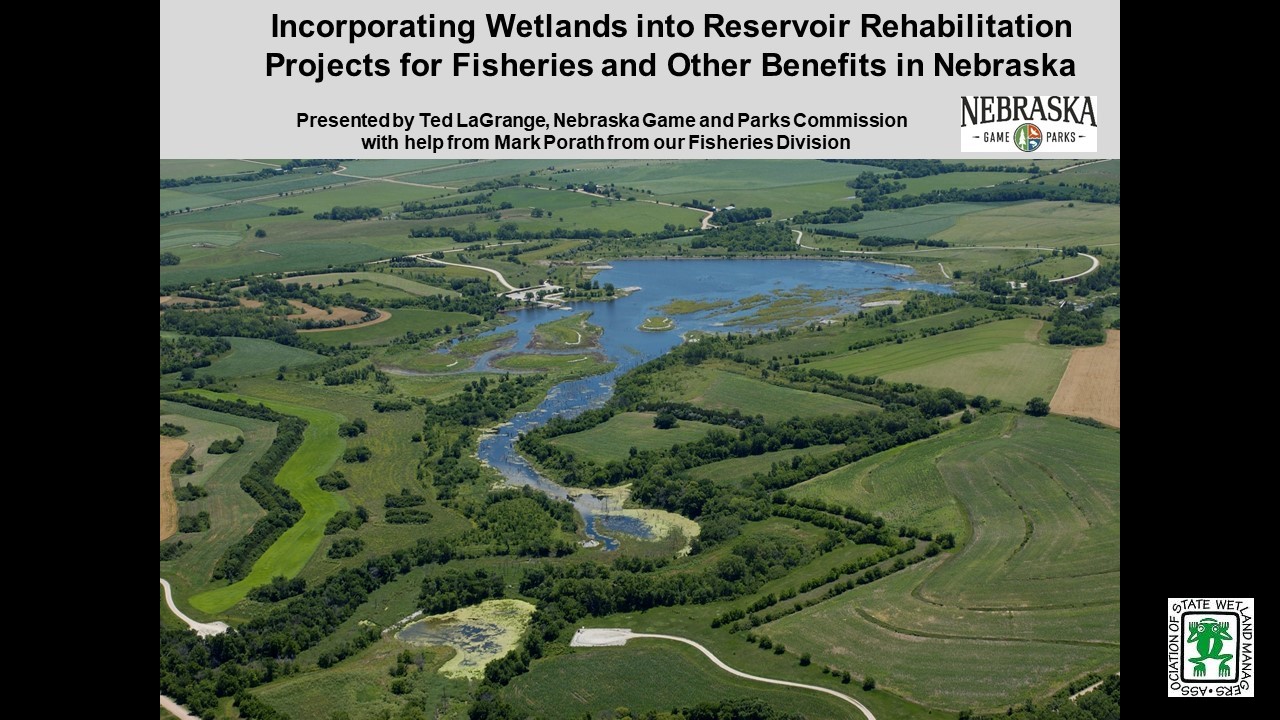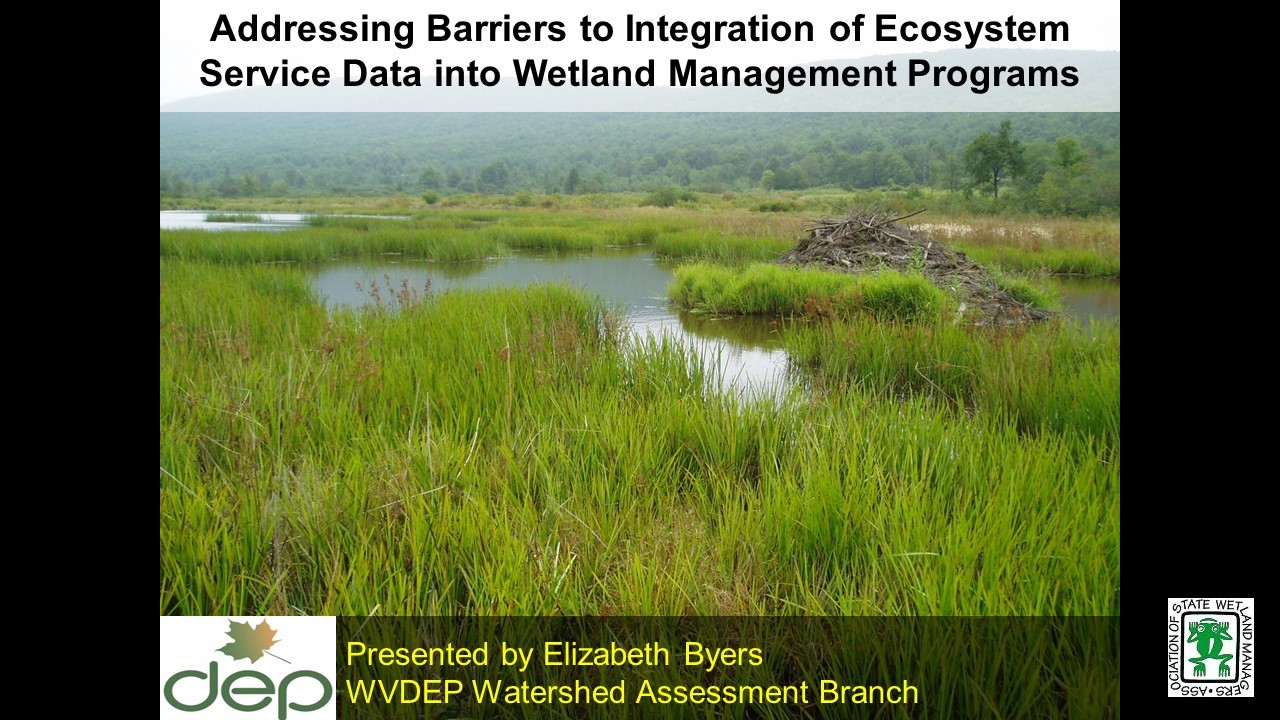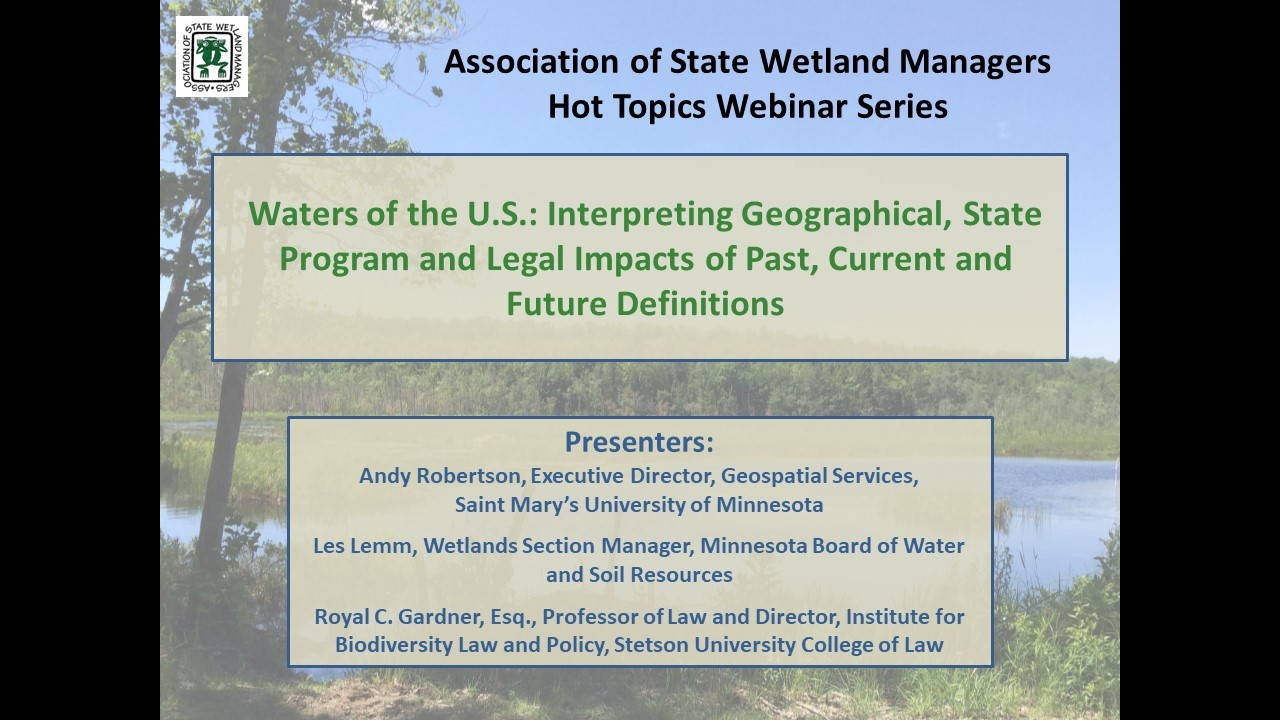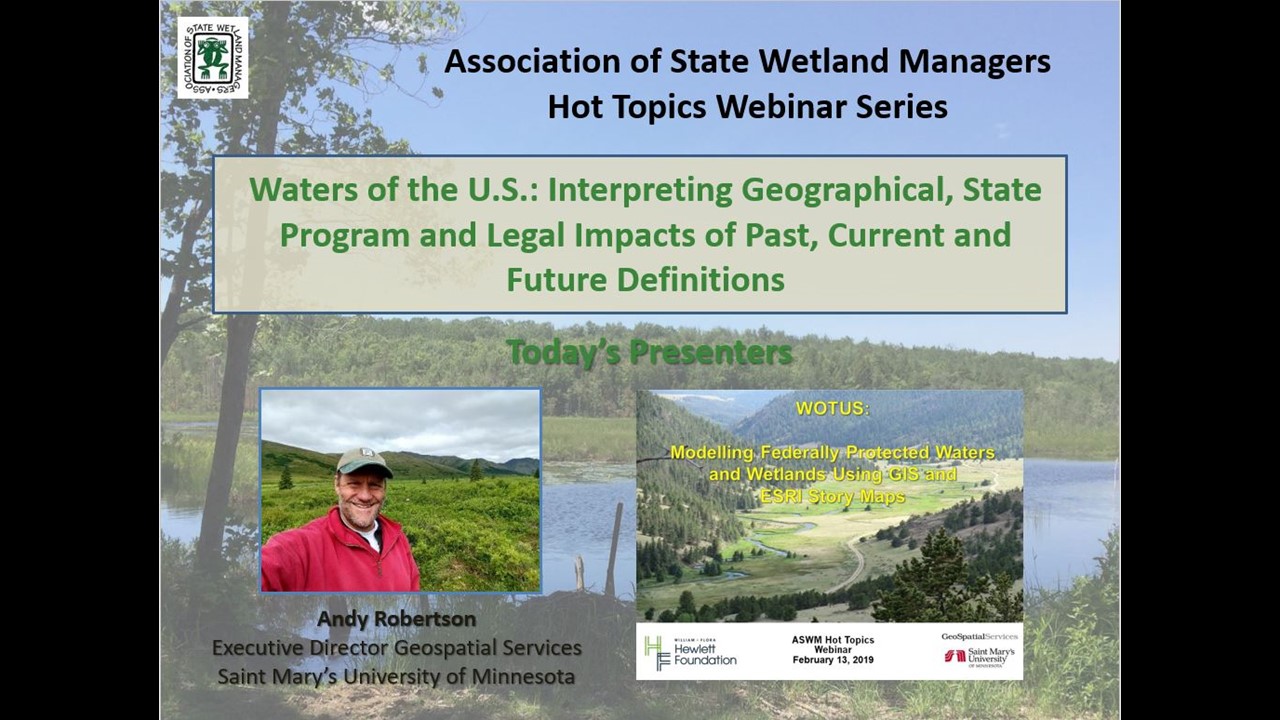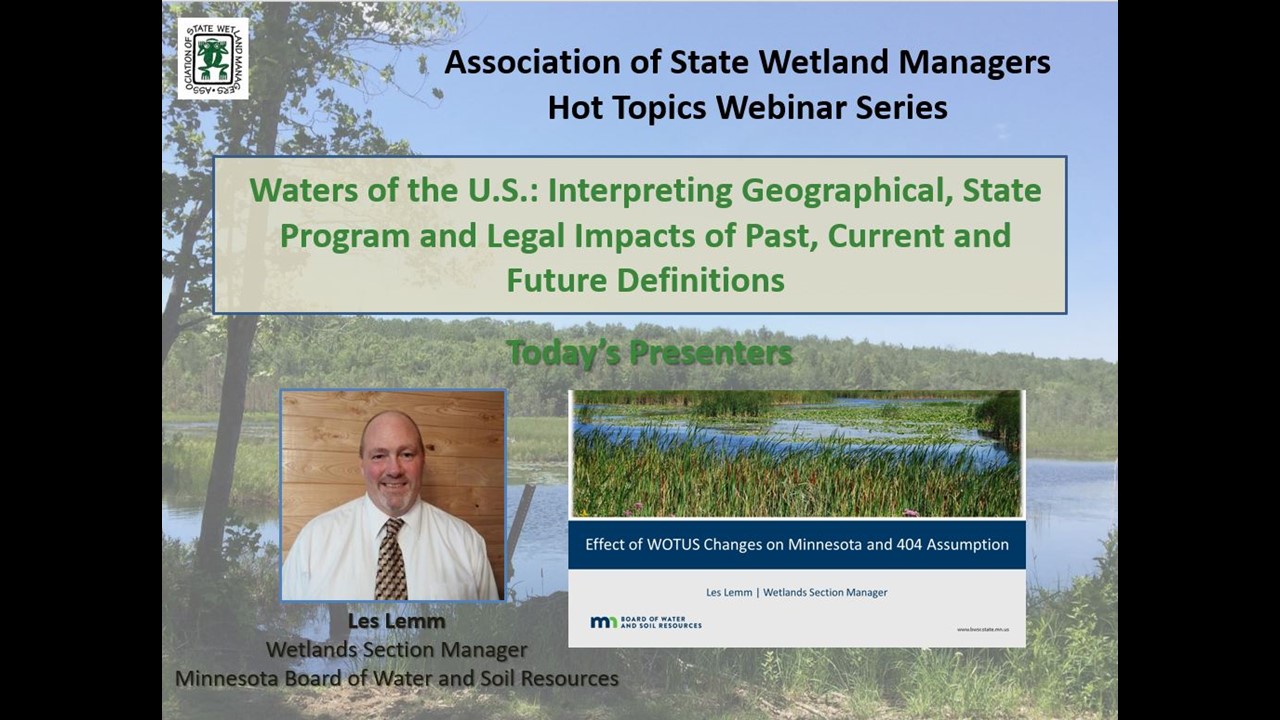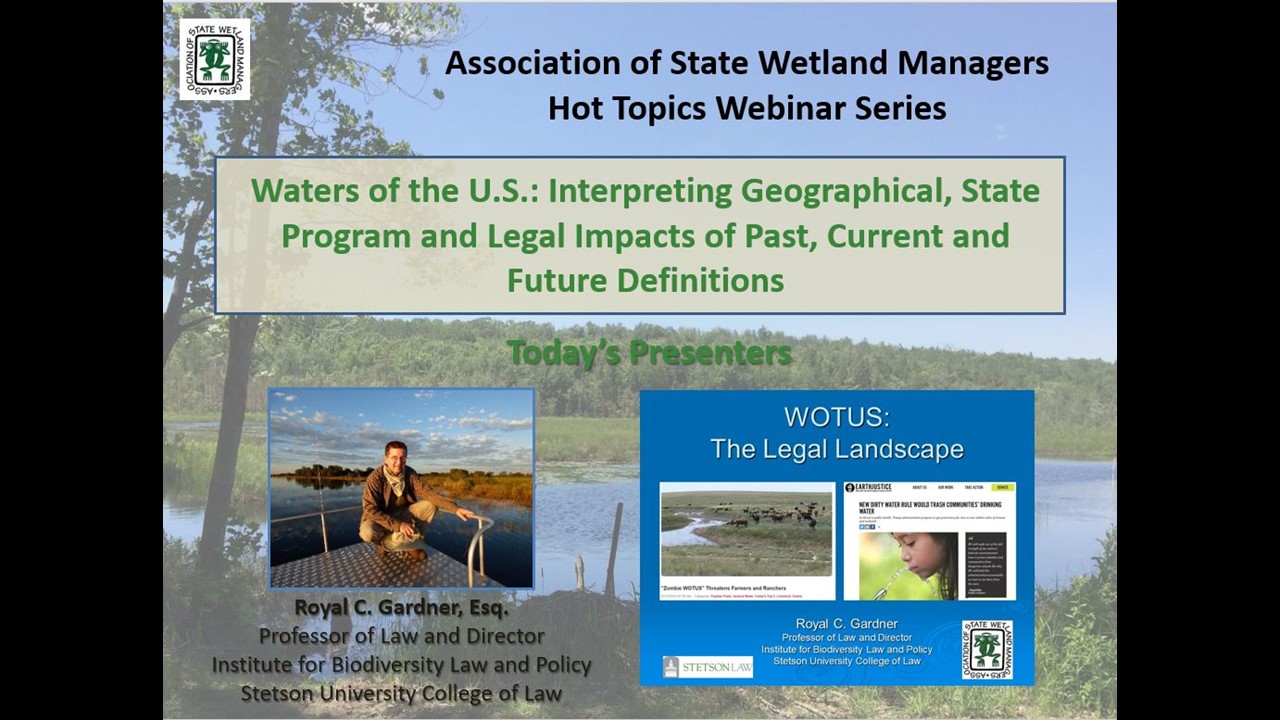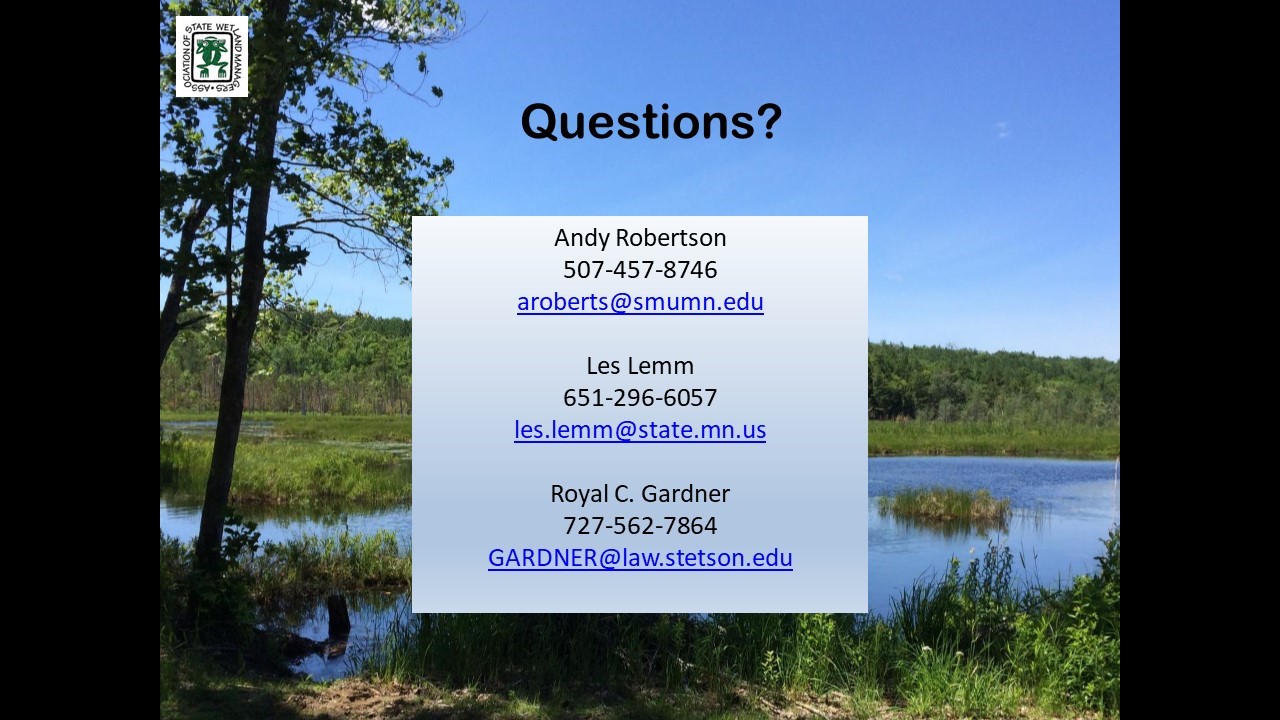A Legal Analysis of the Clean Water Act § 401 Proposed Rule
Held Friday, September 20, 2019 - 3:00-5:00 pm Eastern
INTRODUCTION
Marla Stelk, Executive Director, Association of State Wetland Managers [PRESENTATION PDF]
PRESENTERS
- Royal C. Gardner, Professor of Law and Director of the Institute for Biodiversity Law and Policy, Stetson University College of Law [PRESENTATION PDF]
- Mark A. Ryan, Principal, Ryan & Kuehler PLLC [PRESENTATION PDF]
- James M. McElfish, Jr., Senior Attorney, Environmental Law Institute [PRESENTATION PDF]
ABSTRACTS
On Thursday, August 22, 2019, the U.S. Environmental Protection Agency’s (EPA) proposed rule for changes to Clean Water Act (CWA) Section 401 was published in the Federal Register. The EPA has only provided a 60-day public comment period - comments are due on or before Monday, October 21, 2019 – however, EPA has requested feedback on over 130 questions. CWA § 401 is a direct grant of authority to states (and tribes that have been approved for “treatment as a state” status) to review for compliance with appropriate federal, state, and tribal water quality requirements any proposed activity that requires a federal license or permit and may result in a discharge to waters of the United States. The proposed rule has significant legal and policy implications for states’ rights to protect their water quality within their own boundaries. To assist states, tribes and others in understanding the potential legal concerns surrounding the proposed rule, ASWM has invited three of the nation’s top Clean Water Act attorneys to provide a history of significant court cases regarding § 401, its use by states and tribes, and a legal analysis of the proposed rule and potential impacts.
Royal C. Gardner
Gardner provided a history of state water quality certification provisions, beginning with the Water Quality Improvement Act of 1970. He discussed the key U.S. Supreme Court cases that interpret Clean Water Act Section 401 (PUD No. 1 of Jefferson County v. Washington Department of Ecology and S.D. Warren Co. v. Maine Board of Environmental Protection), as well as other cases mentioned in the proposed rulemaking. He will also highlight significant aspects of the proposed rule: time limitations on state certification decisions; restrictions on the scope of what states may consider in the certification process; and federal agency review (and possible rejection) of state certification decisions.
Mark A. Ryan
Mark discussed the administrative process EPA is required to follow to promulgate a final rule, how the likely litigation will play out and the possibility of Congress invoking the Congressional Review Act. Mark also discussed how this effort fits into other CWA reform efforts by the Trump administration.
James M. McElfish, Jr.
James discussed the reliance by many states on 401 as a basis for wetlands regulatory programs; the various types of conditions that states have applied to 401 certifications to protect water quality in the context of federal licenses and permits and what limitations the proposed rule would place on such conditions; and the potential impacts of the proposed rule on enforceability of state conditions.
BIOS
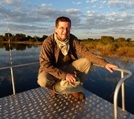 Royal C. Gardner is Professor of Law and Director of the Institute for Biodiversity Law and Policy at Stetson University College of Law. He is an internationally recognized expert in wetland law and policy. Recent projects include serving as the Chair of the Scientific and Technical Review Panel of the Ramsar Convention on Wetlands, testifying before a World Bank arbitration panel, advising the Government of Oman regarding wetland policy, and coauthoring amicus briefs on behalf of environmental scientists. In WOTUS-related litigation, he has filed amicus briefs in the U.S. Court of Appeals for the Sixth Circuit, and in the U.S. District Courts for the District of North Dakota and the Southern District of New York.
Royal C. Gardner is Professor of Law and Director of the Institute for Biodiversity Law and Policy at Stetson University College of Law. He is an internationally recognized expert in wetland law and policy. Recent projects include serving as the Chair of the Scientific and Technical Review Panel of the Ramsar Convention on Wetlands, testifying before a World Bank arbitration panel, advising the Government of Oman regarding wetland policy, and coauthoring amicus briefs on behalf of environmental scientists. In WOTUS-related litigation, he has filed amicus briefs in the U.S. Court of Appeals for the Sixth Circuit, and in the U.S. District Courts for the District of North Dakota and the Southern District of New York.
 Mark Ryan is an Attorney with Ryan & Kuehler PLLC in Winthrop, Washington where he has a national and regional practice that focuses on Clean Water Act (CWA) counseling and litigation, water rights and land-use issues. Prior to Ryan & Kuehler, Mr. Ryan spent 24 years as an EPA trial attorney, where he was one of EPA's leading experts on the CWA. He has published and spoken extensively on the CWA, and he is the long-standing editor of the American Bar Association’s Clean Water Act Handbook. He received his B.S. in natural resources from the University of Michigan and his law degree from Indiana University School of Law (cum laude), where he was an editor of the Indiana Law Journal. Mr. Ryan's Clean Water Act Blog, where he provides summaries of recent developments under the CWA, can be viewed at ryankuehler.com. Mr. Ryan can be reached at mr@ryankuehler.com.
Mark Ryan is an Attorney with Ryan & Kuehler PLLC in Winthrop, Washington where he has a national and regional practice that focuses on Clean Water Act (CWA) counseling and litigation, water rights and land-use issues. Prior to Ryan & Kuehler, Mr. Ryan spent 24 years as an EPA trial attorney, where he was one of EPA's leading experts on the CWA. He has published and spoken extensively on the CWA, and he is the long-standing editor of the American Bar Association’s Clean Water Act Handbook. He received his B.S. in natural resources from the University of Michigan and his law degree from Indiana University School of Law (cum laude), where he was an editor of the Indiana Law Journal. Mr. Ryan's Clean Water Act Blog, where he provides summaries of recent developments under the CWA, can be viewed at ryankuehler.com. Mr. Ryan can be reached at mr@ryankuehler.com.
 James M. McElfish, Jr. is a Senior Attorney; Director with the Environmental Law Institute Sustainable Use of Land Program.
James M. McElfish, Jr. is a Senior Attorney; Director with the Environmental Law Institute Sustainable Use of Land Program.
Jim McElfish’s research focuses on development choices and their links to land use, water resources, biological diversity, and infrastructure policy. ELI’s Sustainable Use of Land Program makes connections among laws, policies, taxes, investments, and land use decisions. His work includes research on coastal zone activities, renewable energy siting, enforcement, and conservation outcomes. McElfish served as representative of the natural environment on the American Planning Association’s multi-year Growing Smarter Legislative Guidebook Directorate. McElfish also leads ELI programs on water resources, examining how watersheds and resources can be evaluated, used, conserved, and restored. He is a nationally recognized authority on NEPA and a former litigator in private practice and with the Department of the Interior. McElfish has been an ELI Senior Attorney since 1986.
SPONSORED BY:
U.S. Fish and Wildlife Service
INTRODUCTION
William Dooley, Policy Analyst, Association of State of Wetland Managers [PRESENTATION PDF]
PRESENTERS
- Todd Mitchell, Swinomish Tribe
- Ryan Emanuel, Ph.D. of North Carolina State University [PRESENTATION PDF]
ABSTRACTS
Todd Mitchell & Nicole Casper, Swinomish Tribe
Using Traditional Ecological Knowledge to Protect Wetlands: The Swinomish Tribe’s Wetlands Cultural Assessment Project
Traditional wetland physical assessments do not adequately identify tribal cultural values of wetlands and thus are not adequately protecting cultural uses. The Swinomish Wetlands Cultural Assessment Project has developed a cultural module that can be incorporated into wetland assessments to better inform wetland protections. Local native knowledge was gathered about the traditional uses of 99 plant species. A cultural module was developed based on the presence of plants in several use categories including: construction, ceremonial, subsistence, medicinal, common use, plant rarity, and place of value for each wetland. The combined score of the cultural and physical modules provides an overall wetland score that relates to proscribed buffer protection widths through the Tribe’s wetland protection law. We hope this innovative method can serve as a model in combining traditional cultural values with scientific methods to help promote the breadth of knowledge our ancestors possessed into modern practical environmental protection.
Ryan Emanuel, North Carolina State University
Water in the Lumbee World: Challenges and opportunities to protecting a culturally significant river and its wetlands in an era of rapid environmental change
The Lumbee (or Lumber) River is a culturally important blackwater stream for the 60,000-member Lumbee Tribe of North Carolina. The river, its tributaries, and their adjacent swamps have protected and sustained Lumbee people and their ancestors for countless generations in the Coastal Plain of present-day North Carolina. Recent years have experienced renewal of cultural practices associated with water, the river, and wetlands among Lumbee people, but climate change and development pose threats to culturally-important wetlands and riverine ecosystems. I highlight some of these cultural practices and discuss recent research efforts to assess various threats. I also discuss key public policy tools available to Lumbee people and their tribal government for the protection of cultural landscapes while highlighting the challenges of leveraging policy as a non-federally recognized American Indian tribe. The discussion included recommendations for wetland managers and decision-makers who interact with American Indian tribes and Indigenous groups.
BIOS
 Todd A. Mitchell, swəlítub, a Swinomish Tribal citizen, is the Director of the Swinomish Department of Environmental Protection. He graduated from Dartmouth College (BA, Earth Sciences & Film Studies) and Washington State University (MS, Geology) specializing in hydrogeology, igneous petrology and geochemistry. Todd works for Swinomish as a geologist and indigenous scientist researching the Tribe's water resources including traditional ecological knowledge, tidelands, surface water, groundwater, wetlands, and salmon habitat restoration research.
Todd A. Mitchell, swəlítub, a Swinomish Tribal citizen, is the Director of the Swinomish Department of Environmental Protection. He graduated from Dartmouth College (BA, Earth Sciences & Film Studies) and Washington State University (MS, Geology) specializing in hydrogeology, igneous petrology and geochemistry. Todd works for Swinomish as a geologist and indigenous scientist researching the Tribe's water resources including traditional ecological knowledge, tidelands, surface water, groundwater, wetlands, and salmon habitat restoration research.
 Ryan E. Emanuel is an Associate Professor and University Faculty Scholar in the Department of Forestry and Environmental Resources at North Carolina State University. He is an enrolled member of the Lumbee Tribe. Emanuel studies fresh water and biogeochemical cycles in a wide range of upland and wetland environments using fieldwork, modeling, and geospatial analysis. He has published more than 40 peer-reviewed articles on topics ranging from hydrology and ecology to environmental history and policy. Emanuel serves on the environmental justice committee of the North Carolina Commission of Indian Affairs and works with tribal governments in North Carolina on topics related to the environment, education, and energy. He holds a BS in Geology from Duke University and graduate degrees (MS, PhD) in Environmental Sciences from the University of Virginia.
Ryan E. Emanuel is an Associate Professor and University Faculty Scholar in the Department of Forestry and Environmental Resources at North Carolina State University. He is an enrolled member of the Lumbee Tribe. Emanuel studies fresh water and biogeochemical cycles in a wide range of upland and wetland environments using fieldwork, modeling, and geospatial analysis. He has published more than 40 peer-reviewed articles on topics ranging from hydrology and ecology to environmental history and policy. Emanuel serves on the environmental justice committee of the North Carolina Commission of Indian Affairs and works with tribal governments in North Carolina on topics related to the environment, education, and energy. He holds a BS in Geology from Duke University and graduate degrees (MS, PhD) in Environmental Sciences from the University of Virginia.
SPONSORED BY:
- National Oceanic and Atmospheric Administration
- U.S. Fish and Wildlife Service
- USDA Natural Resources Conservation Service
- U.S. Environmental Protection Agency
INTRODUCTION
- William Dooley, Policy Analyst, Association of State of Wetland Managers [PRESENTATION PDF]
PRESENTER
- J. Letitia Grenier, PhD, San Francisco Estuary Institute [PRESENTATION PDF]
ABSTRACT
The scientists, managers, regulators and restoration experts of the San Francisco Bay shore have been working to proactively plan for our future estuary. Over 200 people in this community contributed to a science synthesis of how to restore and maintain valuable tidal marshes, given that current models predict they will "drown" over time. This effort was followed by a regional analysis of nature-based approaches to protect the shoreline, with place-specific mapping for every segment of hundreds of miles of the coast. The approach and conceptual models were designed to be applicable elsewhere, and may be scalable models for other regions.
BIO
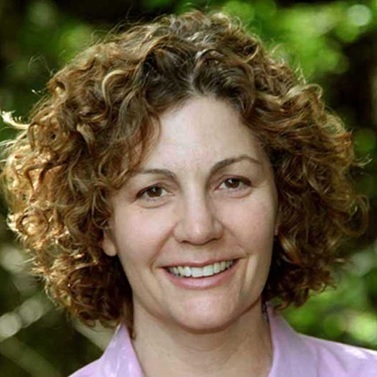 Letitia Grenier co-directs SFEI's Resilient Landscapes Program. She is the science lead for the 2015 State of the Estuary Report (a SF Estuary Partnership project) and the 2015 update to the Baylands Ecosystem Habitat Goals (a California Coastal Conservancy project), heading a team of over 200 environmental scientists, managers, and regulators to develop science based recommendations for restoring and maintaining the health the Bay's tidal wetlands in the face of rising sea levels and other stressors. Letitia holds a PhD in Conservation Biology from the University of California at Berkeley and has previously worked on investigating bioaccumulation of contaminants in estuarine food webs, the condition of California’s wetlands, and other ecological questions about the Bay and Delta. Her focus now is to work with partners to conserve California's living resources by developing landscape-scale, collaborative, science based visions and solutions.
Letitia Grenier co-directs SFEI's Resilient Landscapes Program. She is the science lead for the 2015 State of the Estuary Report (a SF Estuary Partnership project) and the 2015 update to the Baylands Ecosystem Habitat Goals (a California Coastal Conservancy project), heading a team of over 200 environmental scientists, managers, and regulators to develop science based recommendations for restoring and maintaining the health the Bay's tidal wetlands in the face of rising sea levels and other stressors. Letitia holds a PhD in Conservation Biology from the University of California at Berkeley and has previously worked on investigating bioaccumulation of contaminants in estuarine food webs, the condition of California’s wetlands, and other ecological questions about the Bay and Delta. Her focus now is to work with partners to conserve California's living resources by developing landscape-scale, collaborative, science based visions and solutions.
Please click only once on each video recording to view in this window.
Presentations at the Association of State Wetland Managers
2019 Annual State/Tribal/Federal Coordination Meeting
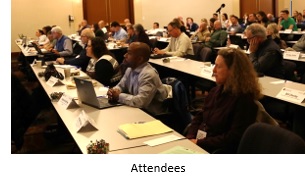 PRESENTATIONS
PRESENTATIONS
Integrated Wetland and Stormwater Program
-
- Brian Wolff, Surface Water, Operations and Enforcement Branch Chief, Indiana Department of Environmental Management
Incorporating Wetlands into Reservoir Rehabilitation Projects for Fisheries and Other Benefits in Nebraska
-
- Ted LaGrange, Wetland Program Manager, Nebraska Game and Parks Commission
Addressing Barriers to Integration of Ecosystem Service Data into Wetland Management Programs
-
- Elizabeth Byers, Senior Wetland Scientist, West Virginia Department of Environmental Protection
BIOS
Brian Wolff serves as the Branch Chief of Surface Water, Enforcement, and Operations for the Indiana Department of Environmental Management. The branch covers Wetlands, Stormwater, MS4’s, as well as enforcement cases and operational duties for all of the water quality division. Prior to joining Water Quality, Brian served 10 years as manager of the Special Projects Section in the Office of Air Quality, and for 5 years evaluated risk assessments in the Office of Land Quality. Brian has a Bachelor of Science in Biology from Indiana University.
Ted Lagrange has worked as the Wetland Program Manager for the Nebraska Game and Parks Commission for 25 years. As Wetland Program Manager he works on a wide variety of wetland issues throughout Nebraska including partnerships, private land restoration programs, public lands management, research, regulations, and outreach. Prior to moving to Nebraska, he worked for 8 years as a Waterfowl Research Technician for the Iowa Department of Natural Resources. Ted received B.S. and M.S. degrees in Wildlife Biology from Iowa State University. His professional interests are in prairie wetlands and waterfowl/waterbird ecology.
Elizabeth Byers M.S. is a Senior Wetland Scientist with the West Virginia Department of Environmental Protection (WVDEP). Her current project at WVDEP is developing a combined field and automated-GIS protocol for rapidly assessing the functions of wetlands, which is currently nearing regulatory rollout. Ms. Byers’ education includes an undergraduate degree in Geology from Brown University, Master’s in Hydrology from New Mexico Tech, and additional graduate work in ecology at Oregon State University. Prior to joining state government, Ms. Byers worked for 20 years with non-profits as an ecologist and conservationist in the Himalayas, East African rift, Rocky Mountains, and Appalachians.
![]()
Waters of the U.S.: Interpreting Geographical, State Program and Legal Impacts of Past, Current and Future Definitions
Held Wednesday, February 13, 2019 - 1:00 p.m.-3:00 p.m. Eastern
INTRODUCTION
- Marla Stelk, Association of State of Wetland Managers [PRESENTATION PDF]
ABSTRACT
On December 11, 2018, the U.S. Environmental Protection Agency and the U.S. Army Corps of Engineers (the agencies) signed the proposed “Revised Definition of ‘Waters of the United States’” rule. The agencies’ proposal is the second step in a two-step process to review and revise the definition of “Waters of the United States” (WOTUS) consistent with the February 2017 Presidential Executive Order entitled “Restoring the Rule of Law, Federalism, and Economic Growth by Reviewing the ‘Waters of the United States’ Rule.” Interpreting the potential impacts of a revised definition is no easy task, especially given the diversity of aquatic systems and landscapes across the nation, the tremendous diversity of state wetland and water resource programs, the incongruous Supreme Court decisions of the past, and the multiple legal challenges that could potentially continue far into the future.
PRESENTERS
- Andy Robertson, Executive Director of Geospatial Services at Saint Mary’s University of Minnesota, will share the results of a project that examines the spatial extent of wetlands and waters that are protected or unprotected under three different Waters of the US definitions; one based on the 2015 Clean Water Rule and two others based on Supreme Court decisions that narrow the scope of federally protected waters. This presentation will also demonstrate the use of ESRI Story Map technology as a communication tool for presenting spatial, text and graphic data to technical and non-technical audiences. [PRESENTATION PDF]
- Les Lemm, Wetlands Section Manager for the Minnesota Board of Water and Soil Resources will present on the relationship of the WOTUS rule to Section 404 assumption, its likely effect in Minnesota, and some perspectives from staff with stand-alone state programs. [PRESENTATION PDF]
- Royal Gardner, Professor of Law and Director of the Institute for Biodiversity Law and Policy at Stetson University College of Law, will discuss the legal landscape: an overview of past cases that have influenced the various definitions of WOTUS, an update on current WOTUS-related litigation, and a preview of expected future WOTUS legal challenges.[PRESENTATION PDF]
BIOS
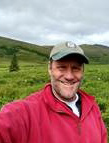 Andy Robertson is currently Executive Director of GeoSpatial Services at Saint Mary’s University of Minnesota. In this role, Andy is responsible for oversight and management of all GeoSpatial Services projects, activities and staff. GeoSpatial Services is engaged in a wide variety of projects across the Lower 48 and Alaska including: wetland inventory; National Hydrography Dataset updates; spatial data development; and, natural resource condition assessments. Andy earned a Forest Technology Diploma from Sault College of Applied Technology in Ontario, Canada, a B.Sc. in Environmental Science from the University of Waterloo and completed postgraduate work in forest management at the University of Toronto. GeoSpatial Services has been a key partner of the USFWS and has been working for over 15 years to update legacy National Wetland Inventory data across the nation. Andy is a steering committee member for the ASWM Wetland Mapping Consortium and is co-chair of the Alaska GeoSpatial Council Wetland Technical Working Group.
Andy Robertson is currently Executive Director of GeoSpatial Services at Saint Mary’s University of Minnesota. In this role, Andy is responsible for oversight and management of all GeoSpatial Services projects, activities and staff. GeoSpatial Services is engaged in a wide variety of projects across the Lower 48 and Alaska including: wetland inventory; National Hydrography Dataset updates; spatial data development; and, natural resource condition assessments. Andy earned a Forest Technology Diploma from Sault College of Applied Technology in Ontario, Canada, a B.Sc. in Environmental Science from the University of Waterloo and completed postgraduate work in forest management at the University of Toronto. GeoSpatial Services has been a key partner of the USFWS and has been working for over 15 years to update legacy National Wetland Inventory data across the nation. Andy is a steering committee member for the ASWM Wetland Mapping Consortium and is co-chair of the Alaska GeoSpatial Council Wetland Technical Working Group.
 Les Lemm is the Wetlands Section Manager for the Minnesota Board of Water and Soil Resources. He is responsible for overseeing implementation of the State Wetland Conservation Act, Minnesota’s comprehensive wetland protection law, including a robust wetland banking program. He has a variety of other experience, including working as a charter boat captain on Minnesota’s Lake of the Woods, a natural resource consultant, and the District Manager for the Lake of the Woods Soil and Water Conservation District. Les has a Bachelor’s degree in Natural Resource Management from the University of Minnesota and a Master’s degree in Resource Economics from North Dakota State University.
Les Lemm is the Wetlands Section Manager for the Minnesota Board of Water and Soil Resources. He is responsible for overseeing implementation of the State Wetland Conservation Act, Minnesota’s comprehensive wetland protection law, including a robust wetland banking program. He has a variety of other experience, including working as a charter boat captain on Minnesota’s Lake of the Woods, a natural resource consultant, and the District Manager for the Lake of the Woods Soil and Water Conservation District. Les has a Bachelor’s degree in Natural Resource Management from the University of Minnesota and a Master’s degree in Resource Economics from North Dakota State University. Royal C. Gardner is Professor of Law and Director of the Institute for Biodiversity Law and Policy at Stetson University College of Law. He is an internationally recognized expert in wetland law and policy. Recent projects include serving as the Chair of the Scientific and Technical Review Panel of the Ramsar Convention on Wetlands, testifying before a World Bank arbitration panel, advising the Government of Oman regarding wetland policy, and coauthoring amicus briefs on behalf of environmental scientists. In WOTUS-related litigation, he has filed amicus briefs in the U.S. Court of Appeals for the Sixth Circuit, and in the U.S. District Courts for the District of North Dakota and the Southern District of New York.
Royal C. Gardner is Professor of Law and Director of the Institute for Biodiversity Law and Policy at Stetson University College of Law. He is an internationally recognized expert in wetland law and policy. Recent projects include serving as the Chair of the Scientific and Technical Review Panel of the Ramsar Convention on Wetlands, testifying before a World Bank arbitration panel, advising the Government of Oman regarding wetland policy, and coauthoring amicus briefs on behalf of environmental scientists. In WOTUS-related litigation, he has filed amicus briefs in the U.S. Court of Appeals for the Sixth Circuit, and in the U.S. District Courts for the District of North Dakota and the Southern District of New York.
View Past Hot Topics Webinars Here
View a List of Past Hot Topics Webinar Recordings Here
View Upcoming Hot Topics Webinars Here


